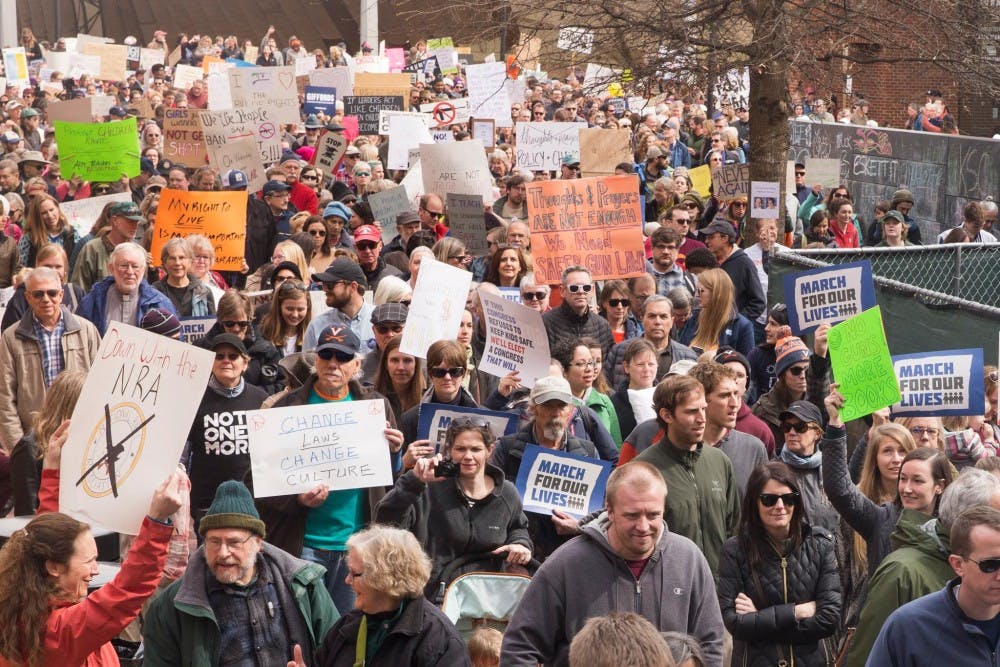Thousands gathered at the nation’s capital for the March For Our Lives, an anti-gun violence march on Saturday, March 24. The D.C. event was organized by the survivors of the Parkland shooting in February and included a day full of events in addition to 846 events being held worldwide. It was reported that many restaurants and hot spots around Washington were offering freebies to demonstrators, and many famous faces made appearances. The #NeverAgain movement associated with the march has captivated the nation’s attention and the efforts of participants, especially those that are students, have been applauded in the media and supported. This same level of support, however, has not been extended to other movements like #BlackLivesMatter, that also advocate against government-sanctioned gun violence. In the past there has been resistance against these movements, claiming that they are not inclusive enough. The March for Our Lives and #NeverAgain movement are the #AllLivesMatter movement that America’s been waiting for.
#BlackLivesMatter was created in 2013 by Patrisse Cullors, Alicia Garza and Opal Tometi in response to the acquittal of Trayvon Martin’s murderer, George Zimmerman. At its core, the movement sought to address how black life has historically been targeted and affirm that black life was valuable — though it was not treated as such. The hashtag was employed to call attention to the deaths of unarmed African Americans like Michael Brown, Tamir Rice, Tanisha Anderson, Walter Scott, Sandra Bland and Philando Castille, who were victims of police brutality. The emphasis was on the idea that black lives matter too, an idea that was constantly ignored. #WhiteLivesMatter, #BlueLivesMatter and, most notably, #AllLivesMatter emerged as counter movements to #BlackLivesMatter, which excluded everyone else. Though more inclusive, the narrative of #AllLivesMatter overshadows the fact that black Americans are more likely to be killed by police. #BlackLivesMatter has been accused of being a terrorist group — and was painted as a growing threat by the FBI — though its basic premise is that human life is valuable.
Although much of the emphasis has been placed on the systematic violence at the hands of police officers, black activists have long advocated for stricter gun-control. In 2013, the same year that #BlackLivesMatter was created, the student activists apart of the Dream Defenders held a sit-in at the Florida Capitol. The 31-day demonstration began after the acquittal of Trayvon Martin’s murderer and hoped to force a special session on the Stand Your Ground law. They were unable to convince Gov. Rick Scott to convene the special session. Yet Parkland students were able to meet with Florida lawmakers, including Gov. Scott, and the state quickly advanced bills. Though the bills armed teachers, they also imposed a three-day waiting period for gun purchase and raised the minimum age to buy a gun from 18 to 21.
The efforts of the students in Dream Defenders are but one example of the fact that young African Americans have long been activists, specifically against gun violence. In 2016, elementary school-age kids, and some adults, protested through a housing project in Liberty City. They are rallying against the inability to play outside without the fear of getting shot. The young students led the parade with signs that read, “Enough is Enough” and “Our Lives Matter”. They, however, were not nationally recognized or supported. They were not placed on magazine covers as the face of the gun control conversation, as has happened with some Parkland survivors.
The march on Saturday was felt around the world — even here in Charlottesville. #NeverAgain, however, is not the first anti-gun-violence movement. Black activists, including young people, have long been advocating against the police and civilian brutality that continuously takes African Americans as victims. They have only asked that the nation see the value in black life. America, however, has clearly picked the Parkland survivors as the spokespeople against gun control.
This new movement seems to be a true example of the #AllLivesMatter argument that was made to topple minority voices. There needs be a conversation on the connection between race and activism, and why there is such a stark contrast in public reaction between white people protesting and people of color protesting. Why is it that when participants chant #BlackLivesMatter, they are faced with officers in riot gear, while the participants of #NeverAgain get a nationally-televised town hall meeting and magazine features? A conversation must be had regarding why non-minorities are immediately the victims and can raise their voices — but minority voices are only heard through their counterparts for saying the same thing. In order for America to truly embrace change in the future, they need to move beyond the #AllLivesMatter narrative that, while claiming to highlight the concerns of all, grossly disregards those on the margins.
Zari Taylor is a Senior Opinion columnist for The Cavalier Daily. She can be reached at opinion@cavalierdaily.com.








